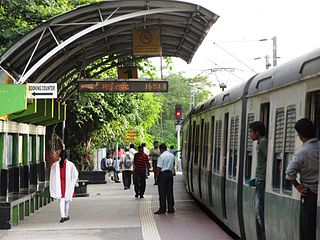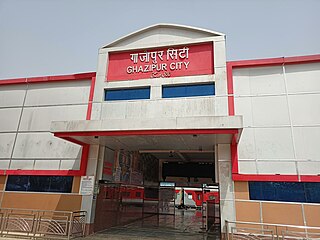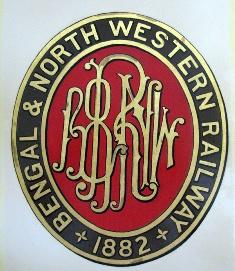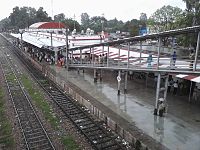
The Kolkata Suburban Railway is a suburban and regional rail system serving the Kolkata metropolitan area and its surroundings in West Bengal, India. Its network has 458 stations and a track length of 1,501 km (933 mi) making it the largest suburban railway network in the country, and also one of the largest in the world. There are five main lines and nineteen branch lines. It operates more than 1,500 services, carrying 3.5 million people daily and 1.2 billion people every year. It runs from IST 03:00 am until 02:00 am approximately and fares range from Rs.5 to Rs.25. The system is electrified with 25 kV 50 Hz AC overhead line and runs on 5 ft 6 in broad gauge track. It has interchange stations with the Kolkata Metro at various locations.

The Bombay, Baroda and Central India Railway was a company incorporated in 1855 to undertake the task of constructing railway lines between Bombay to the erstwhile Baroda State, that became the present-day Baroda (Vadodara) city in western India. BB&CI completed the work in 1864. The first suburban railway in India was started by BB&CI, operating between Virar and Bombay Backbay station, a railway station in Bombay Backbay in April 1867.

Ghazipur City railway station is located in Ghazipur City of Uttar Pradesh. It lies in the Malgodam Road. It comes under North Eastern Railway Zone (NER), Gorakhpur under Varanasi division. The station is directly connected to major cities of India.
Lucknow–Kanpur Suburban Railway System is a commuter rail service operated by Northern Railways, North Central Railway and North Eastern Railway to connect administrative capital Lucknow with the economic and industrial capital Kanpur of the state Uttar Pradesh. These services are mostly run using EMU and MEMU rakes. However it does not have dedicated suburban tracks but share the tracks with long distance trains. It is fondly called LC meaning Lucknow Cawnpore.

Barabanki–Lucknow Suburban Railway is a commuter rail service operated by Northern Railways, North Central Railway and North Eastern Railway to connect Lucknow with Barabanki. These services are mostly run using EMU and MEMU rakes. However it does not have dedicated suburban tracks but share the tracks with long distance trains. Locally it is called BL meaning Barabanki Lucknow.
Akola Junction serves Akola in Akola district in the Indian state of Maharashtra. It is an important junction station on the Howrah–Nagpur–Mumbai line. There is a 5 ft 6 in broad gauge line to Secunderabad railway station and the metre-gauge Akola–Khandwa line is under gauge conversion.

Gorakhpur Junction railway station is located in the city of Gorakhpur in the Indian state of Uttar Pradesh. It has the world's second longest railway platform after Hubballi Junction railway station in Karnataka. It serves as the headquarters of the North Eastern Railway, part of Indian Railways. The station offers Class A+ railway station facilities.

The Pandit Deen Dayal Upadhyaya Junction – Kanpur section, formerly Mughalsarai–Kanpur section, officially Kanpur - Pt. Deen Dayal Upadhyay (CNB-DDU) section, is a railway line connecting Pandit Deen Dayal Upadhyaya Junction (DDU) and Kanpur Central (CNB) stations. This 347 km (216 mi) track is part of the Howrah–Delhi main line and Howrah–Gaya–Delhi line. The main line is under the jurisdiction of North Central Railway. Pandit Deen Dayal Upadhyaya Junction is under the jurisdiction of East Central Railway. Some branch lines are under the jurisdiction of the North Eastern Railway and Northern Railway.

Prayagraj Junction, formerly known as Allahabad Junction, is a railway station on the Howrah-Gaya-Delhi line,Howrah–Delhi main line, Prayagraj–Mau–Gorakhpur main line and Howrah–Prayagraj–Mumbai line. It is the headquarters of the North Central Railway zone. It is located in Prayagraj in the Indian state of Uttar Pradesh. It serves Prayagraj and the surrounding areas.
Unnao Junction Railway Station, also known as Unnao Railway Station, is a major railway station located in Unnao district in the Indian state of Uttar Pradesh. It serves Unnao and the surrounding areas. The station falls under the jurisdiction of the Northern Railway zone of the Indian Railways and serves as a crucial transportation hub for the region. Unnao Junction railway station is on the Lucknow–Kanpur Suburban Railway and Varanasi–Kanpur branch line.

The Bengal and North Western Railway was owned and worked by the Bengal and North Western Railway Company. The Bengal and North Western Railway was merged into the Oudh and Tirhut Railway on 1 January 1943.
Cawnpore–Barabanki Railway (C–B) (1943-1953) (earlier called Cawnpore–Burhwal Railway was a railway in northern India. It was managed as part of the East Indian Railway, and was worked by the Bengal and North Western Railway and the Rohilkund and Kumaon Railway.
Manak Nagar railway station is a small railway station in Lucknow, Uttar Pradesh. Its code is MKG. It serves Lucknow city. The station consists of three platforms. The platforms are not well sheltered.

Aishbagh railway station used to serve the 130 years old metre-gauge railway network, and used to act as a terminal for it. On 15 May 2016 the gauge conversion process started in which the Aishbagh - Sitapur-Lakhimpur - Mailani - Pilibhit section has been completely upgraded to broad gauge as of March 2024 along with Track Electrification.
Daliganj Junction railway station is one of the suburban railway stations in Lucknow district, Uttar Pradesh. Its code is DAL. The station serves as a terminal for Local Passenger Trains that run between Mailani, Sitapur and Lucknow. Lines coming from Aishbagh Jn. diverge here to Sitapur and Mailani Jn. & Malhaur Jn..
This is the timeline for Southern Railway zone that encompasses over present day Tamil Nadu, Kerala and parts of Andhra Pradesh and Karnataka.
Bahraich railway station is a main railway station in Bahraich district, Uttar Pradesh, India. Its code is BRK. It serves the city of Bahraich.
Lakhimpur railway station is the main railway station in Lakhimpur Kheri district, Uttar Pradesh. Its code is LMP. It serves Lakhimpur city. The station has three platforms, all well sheltered. It is a beneficiary of the Amrit Bharat Station Yojna Scheme, which involves the upgrading of facilities such as escalators.

The Lucknow–Gorakhpur line is a railway route in Uttar Pradesh. It is classified as 'B special class' according to Indian Railways standards, and its trains can reach up to 123 kilometres per hour (76 mph) on this line. The line is doubled broad gauge and electrified, and it is the first fully electrified railway line of the North Eastern Railway zone.
Lucknow City railway station is one of the suburban railway stations in Lucknow district, Uttar Pradesh. Its code is LC. It serves Lucknow city. The station consists of three platforms.















